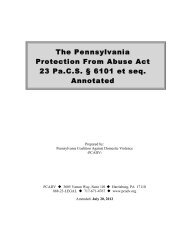Toolkit with Report Form - Pennsylvania Coalition Against Domestic ...
Toolkit with Report Form - Pennsylvania Coalition Against Domestic ...
Toolkit with Report Form - Pennsylvania Coalition Against Domestic ...
You also want an ePaper? Increase the reach of your titles
YUMPU automatically turns print PDFs into web optimized ePapers that Google loves.
Section seven<br />
Honoring Victims<br />
Professionals working in community crisis<br />
response agencies and organizations<br />
recognize that there is sometimes a need<br />
for communities to continue to honor and<br />
remember those lost and/or affected by a<br />
traumatic event. Community leaders can<br />
work <strong>with</strong> these professionals to find ways<br />
to provide such memorials and to do so in<br />
a supportive way that promotes healing<br />
for all groups <strong>with</strong>in the community and<br />
those more directly affected. Conversely,<br />
there may be special events, time markers,<br />
anniversaries and criminal justice activity<br />
that stir emotional reactions in ways that are<br />
once again overwhelming, even if planned<br />
or anticipated. Community leaders should try<br />
to anticipate and prepare for such events;<br />
contact PCADV for technical assistance<br />
and local crisis response professionals for<br />
community assistance and support.<br />
Always consider the wishes of the<br />
surviving family and include them in the<br />
planning if they choose.<br />
The ways in which communities honor victims<br />
vary as widely as the make-up of each<br />
community. Public or private memorials? Or<br />
maybe nothing at all? Primary consideration<br />
rests <strong>with</strong> the family of the direct victim(s); in<br />
some situations, families choose or refuse to<br />
acknowledge certain aspects of a person’s<br />
life and may not acknowledge the domestic<br />
violence at all. Don’t be afraid to be creative,<br />
just anticipate there may be some opposition.<br />
Considerations when making decisions about<br />
memorials:<br />
◗ What would the victim(s) have<br />
preferred? Who would best know the<br />
victim’s wishes?<br />
◗ What does the family want?<br />
◗ What do other survivors want?<br />
◗ The purpose of the memorial?<br />
◗ Location<br />
◗ Audience<br />
◗ Cost<br />
Types of memorials:<br />
◗ Living memorials such as gardens<br />
or remembrance centers. Some living<br />
memorials are now happening online.<br />
◗ Prayer or religious or spiritual services<br />
are common for those who rely on a<br />
higher being for strength through difficult<br />
times.<br />
◗ Permanent memorials serve to<br />
remember and honor victims in future<br />
generations.<br />
◗ Marches and speak-outs provide the<br />
opportunity for actual voices to be heard<br />
and generate public awareness in the<br />
aftermath of a traumatic event.<br />
◗ Races and walks continue to honor the<br />
victim(s); they also provide an opportunity<br />
for community education and usually<br />
include a fundraising component.<br />
Victims and survivors often have<br />
compelling stories that resonate <strong>with</strong> the<br />
public in immeasurable ways.<br />
page 52<br />
When Crisis Strikes | <strong>Pennsylvania</strong> <strong>Coalition</strong> <strong>Against</strong> <strong>Domestic</strong> Violence | 2012








